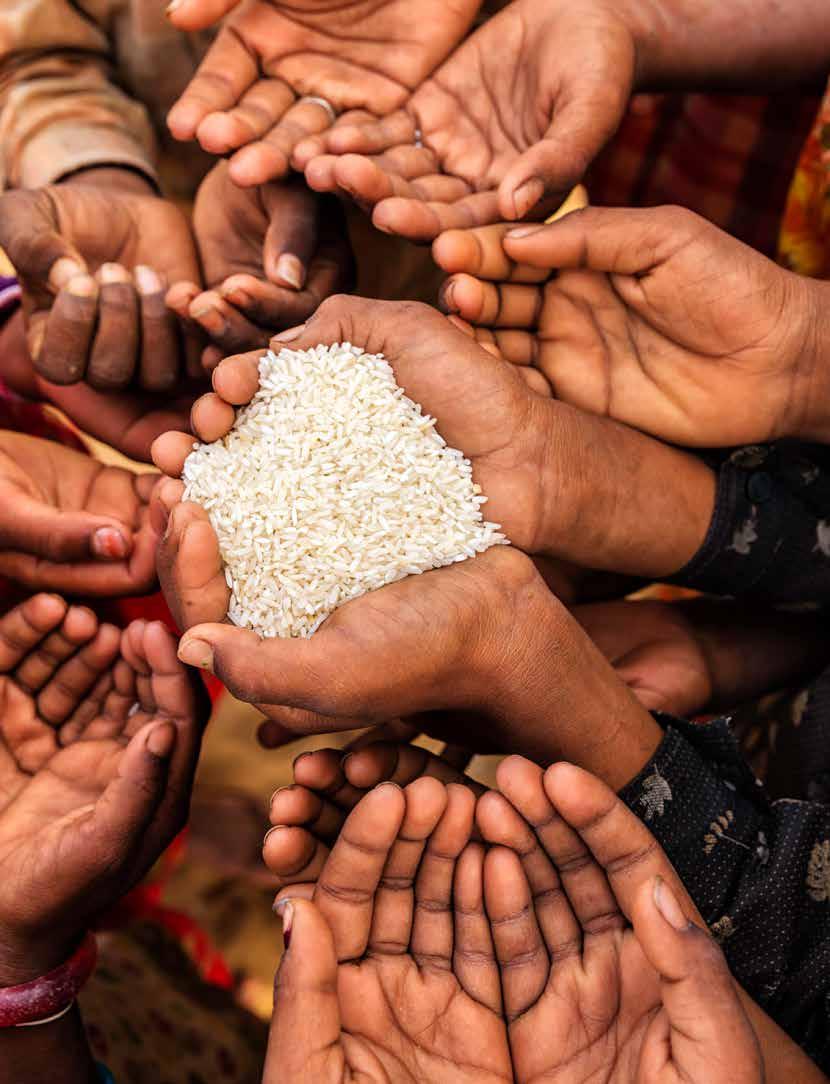

The fight against inequality
Conflicts almost always arise from inequali ties, whether it be in relations between in dividuals, groups or states. It is no coincidence that in the UN Charter and in many present-day constitutions, the principle of equality is placed at the basis of coexistence between states and individuals. Sometimes we take it for granted that equality is a gi ven, as is the case regarding the sovereign equality of states ac cording to the Charter signed in San Francisco or as decreed in Article 3 of the Italian Constitu tion. More often than not howe ver, it is a goal to be achieved.
It has been accepted and re cognized that for far too long there has been a small group of states that has not considered the need to combat inequality. Indeed, the behaviour of these states has often been decisive in giving rise to deplorable pheno mena such as colonization which is now universally condemned. Observing reality, however, one gets the impression that in some parts of the world the process of colonization and exploitation of the natural resources of enti re populations and neighbouring territories, in other forms and in ways different from the past, is causing new inequalities. In the
same way, clusters of inequality between individuals and groups are widening within states, with often serious consequences and with the multiplication of con flicts and situations of serious tension within a population.
It is in this light that we must examine what has happened wi thin the United Nations, parti cularly in the last twenty years, where the fight against inequa lity goes hand in hand with the concept of sustainable deve lopment.
If it was once believed that tre aties were the only instruments suitable for fostering multilate
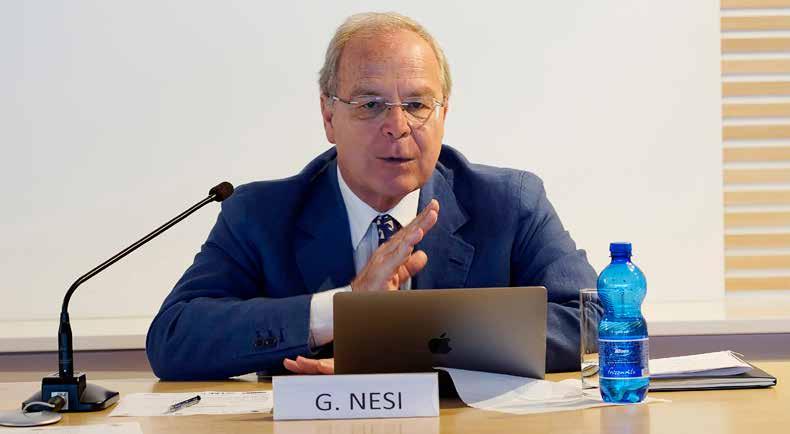
ral cooperation, for several years now the United Nations has been promoting negotiations on do cuments which, are not binding but rather indica te behaviours, principles and values that should be shared within the entire membership. Among these is undoubtedly the fight against inequality and sustainable development. These are also the issues addressed by the Millennium Development Goals and the Sustainable Development Goals of the United Nations.
What better place to organize a meeting on the se issues than the Campana dei Caduti (Rovereto Peace Bell Foundation) - a symbolic setting for the promotion of the ideals of peace and peaceful co existence? Two experts spoke at the meeting, Pro fessor Angelica Bonfanti, of Milan University and Minister Gianluca Alberini, of the Ministry of Fo reign Affairs and International Cooperation, both contributing different perspectives and approa ches in relation to the topics on the agenda.
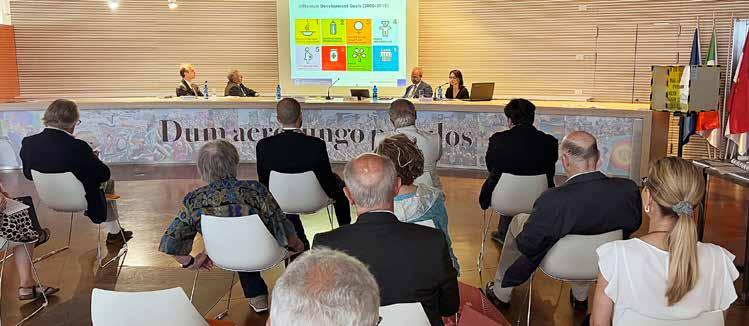
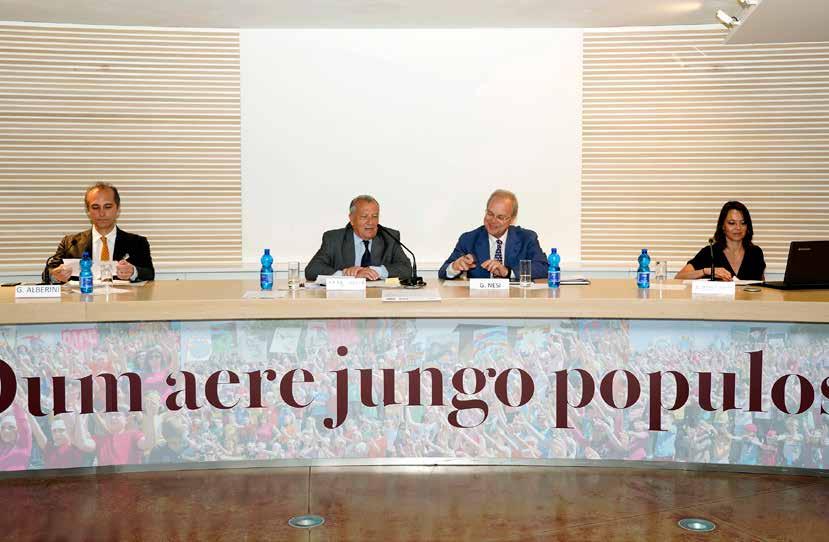
Equality between States and the United Nations
Weare all witness to what is happening in Ukraine, but not only: there are still many conflicts in the world, a pandemic and an environmental crisis but now also a food and energy crisis. All of this is a source of widespread inse curity and instability. An internatio nal “disorder” seems to have repla ced the international order. In the face of a significant loss of people and citizens the demand is growing for reference points in relation to who should do what.
Almost always, when we are con fronted with serious crises like tho se now mentioned, we turn to the UN. One often wonders what it does but above all, what it should do, for example in the case of the war in Ukraine. It is not my intention to dwell on a lesson in international law, especially in the company of profes sors with considerable expertise on the subject. However, I would like to focus on a number of historical pas sages so as to have a better under standing of the United Nations, of what it is today and perhaps, also try to understand its future.
One could start from the very name, “United Nations”, which in the beginning indicated the Sta tes which fought the Powers of the Tripartite Pact (Germany, Ja pan and Italy) during the Second World War. The same countries had pledged to accept the prin ciples decreed in the Atlantic Charter (conceived by US Presi dent Roosvelt and British Prime Minister Churchill), which stated: « All the nations of the world, for realistic as well as spiritual rea sons, must come to the abandon ment of the use of force».
The application of this principle had already been attempted with the forerunner of the UN, the Le
ague of Nations, born on the im pulse of another American Presi dent, Wilson, in 1919 - when he elaborated the famous 14 Points. Even then, after the First World War, efforts were made to gua rantee international peace and security by preventing conflicts and promoting economic and so cial progress. This objective, as we know, failed for various re asons with the outbreak of the Second World War. Yet the Lea gue of Nations had introduced a fundamental principle: all states could join together, on an equal basis. The principle of sovereign equality between states was be ginning to take hold.
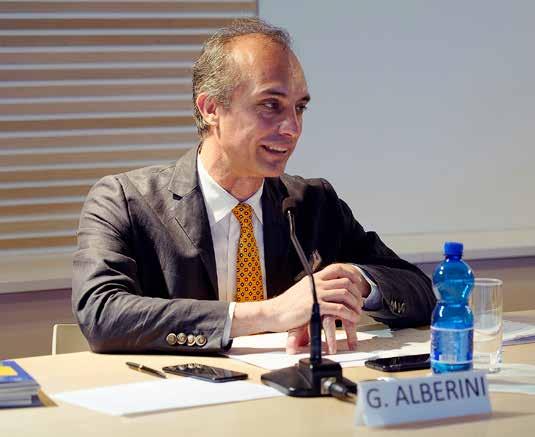
When the UN does not respond, it is because the complex mechanisms that move the organization have been brought to a halt
The United Nations Charter, which came into being in 1945, solemnly reaffirmed this in its second arti cle. The fundamental purposes of the Charter and of the United Na tions Organization were - and still are today - the maintenance of international peace and security on the basis of equality between states, as well as the development of nations in economic, social and cultural spheres.
These concepts are not taken for granted, even if today it might seem so.
Another fundamental characteri stic of the UN is that it is an interna tional organization in all respects: it is a legal entity that acts in its own name and in accordance with the rules established in the United Nations Charter and further still in their subsequent application.
The internal structure of the UN is complex, but the two main bo dies are the General Assembly and
In the face of violations such as that of Russia, the Council should provide answers, yet it is incapable of doing so
the Security Council. Essentially, we are dealing respectively with a Parliament and an Executive on a global scale. All Member States have a seat in the Assembly, with the same powers regardless of size or prominence be it political, eco nomic or other. A vote from the United States or Italy formally has the same value as that of Liechten stein or Nauru. Here the principle of equality between states is at its most accomplished.
The Security Council, on the other hand, is a small body: only 15 out of its 193 members may be a part
of it. As we know, five (the United States, United Kingdom, France, Russia and China) are permanent members, while the remaining 10 rotate every two years following the elections that take place in the General Assembly. It is evident here that the principle of equa lity leaves room for other consi derations, particularly if we bear in mind that the five permanent members have the right of veto and that the Council has exclusive authority in responding to threats and / or violations of the interna tional peace. In these situations, the Council is often said to be the police officer who intervenes to identify and condemn the tran sgressors of the rules of peaceful coexistence between States.
One immediately perceives how equality between states is in actual fact a flexible principle, so to speak.
Continued on page 6...
SEMINAR ON JUNE
25TH
«Liberté, Égalité, Fraterni té». The French revolution aries had many flaws and unacceptable methods, but they understood that free dom and equality are inex tricably linked. With regard to fraternity, we enter the private sphere perhaps, but it is certainly a next step and it is no coincidence that it is mentioned last. Those ideals are still far from our grasp as inequalities in some areas of the planet are still growing. In fact, a part of the global popula tion is unable to participate
in social, cultural, political and economic life and is thereby powerless to make a contribution to global de velopment. For this reason, Goal 10 of the 2030 agen da in the United Nations aims to reduce inequalities not only between different countries, but also within the same nations. This was discussed at the Founda tion on 25 June in the sem inar coordinated by Profes sor Giuseppe Nesi, Italian jurist and professor, former dean of the Faculty of Law of the University of Tren to and legal advisor to the president of the United Na tions General Assembly in
its 65th session, from 2010 to 2011. Nesi, a recently elected member of the UN International Law Commis sion (mandate 2023-2027), coordinated an interesting seminar, attended by An gelica Bonfanti, professor of international law at the State University of Milan and Gianluca Alberini, min ister plenipotentiary, at the Ministry of Foreign Affairs and International Cooper ation. In order to provide further food for thought, we report a summary of the interventions that animated the discussion in this spe cial issue of our magazine.
The voice of Maria DolensContinued from page 5...
Moreover, it is necessary to find an effective synthesis of the interests and opinions of 193 States which are often very different from each other.
Allow me here to draw a paral lel with our Constitution which upholds formal equality, but also substantive equality, of citizens before the law, without distinction.
It is acknowledged that some ci tizens face more obstacles than others, and these obstacles must be removed with specific laws and measures. This discourse can be repeated in our sphere and in re lations between states. Although formally all states are the same, it is evident that some have more power than others and at the same time certain states, those referred to as “developing”, have special needs.
It is certainly not easy to accom plish these objectives, also be cause there is less and less time. However, this is a path, of a glo bal nature, capable of providing a broad vision and stimulating the states, perceived not only as governments but civil society as a whole.
In my opinion, this is one of the UN’s prevalent strengths: de spite the fact that the world has radically changed since 1945, it still remains the only world fo rum in which to discuss any glo bal issue and strive to find sha red solutions. Today the need is felt more and more, we require answers that often a single go vernment cannot provide. When the UN does not respond, it is because the complex mechani sms that move the organization have been brought to a halt.
This is why it is fair to ask what works and what doesn’t. The use of the veto, the rotation me chanism in the Security Council and the very division of duties between the organs of the Uni ted Nations are all topics on the agenda. It is obvious that, in the face of evident violations of in ternational peace such as that by Russia, the Council should provi de answers, yet it is incapable of doing so.
In the Human Rights Council, another important UN body, other measures have been taken. The International Criminal Court (whi ch investigates crimes committed by individuals) and the Internatio nal Court of Justice (for disputes between states) are also active in relation to the Ukrainian crisis. Their initiatives focus on accoun tability, as a reminder that no one can escape what is referred to as a rule-based international order. They remind us also, that no unila teral action, according to the logic of force, can ever lead to the pe ace and stability to which the Uni ted Nations aspires.
Paradoxically, therefore, this di sparity can go in two ways and the direction in which it goes de pends on us and the delicate me chanisms developed with the UN.
The 2030 Agenda for Sustainable Development is one of the exam ples of this acknowledgement and commitment to guarantee not only formal but above all sub stantive equality between States, aware that this also implies equa lity between people and popula tions.
In truth, there was no lack of alternative initiatives, first and foremost by the General Assem bly. Three resolutions were pas sed condemning the Russian ag gression and, following the initial proposal of Liechtenstein that I mentioned earlier, it was decided that every time a veto blocks the Security Council, the Assembly must meet within the following 10 days to discuss it. This is an important response and one that highlights the possibility of fin ding alternatives in the event of a political stalemate.
It is therefore important that the international community responds effectively. In this sense, it is right to ask ourselves how to reform the United Nations and above all the Security Council. Italy is the reference point for a very diverse group of states (called Uniting for Consensus), which supports an in termediate approach, in favour of a Security Council that is more re presentative, democratic, accoun table, transparent and effective. We therefore propose the crea tion of new long-term seats (more than the current two years) to be assigned to regional groups rather than to individual countries, also with the possibility of immediate re-election. In this way, countries that would like to commit them selves more, and currently aspi re to a permanent seat (perhaps with a veto) such as Germany, Ja pan, India or Brazil, could obtain a more continuous presence in the Council, while also guaranteeing all the other States greater possi bilities of participation.
The voice of Maria DolensItaly proposes the creation of new seats in the Security Council to be assigned to regional groups
Any reform must be comprehensive and well thought out
The reform of the veto power is one of the most delicate issues, also because it requires the con sent of all five permanent mem bers. However, there are initiati ves to hold permanent members accountable and ensure that the power of veto is not abused.
Article 27 of the United Nations Charter states that in the event of international disputes, the parties involved must abstain from voting in the Council, but this does not apply to threats to international peace and security, that is to say, in the most impor tant cases. France and Mexico have long launched an initiative to pledge permanent members not to use vetoes in the event of mass atrocities and war crimes.
Any reform must in any case be comprehensive and well thought out so as to take into account all aspects (such as the working methods and the relations of the Council itself with the Ge neral Assembly) and above all there should be a broad consen sus among all the States.
For this we are open to dialogue and confrontation with other pro posals. Not to mention the consi derations on the opportunity of a seat for the European Union, whi ch would constitute a great step forward for the integration pro cess, but which would also requi re strong political will and unity.
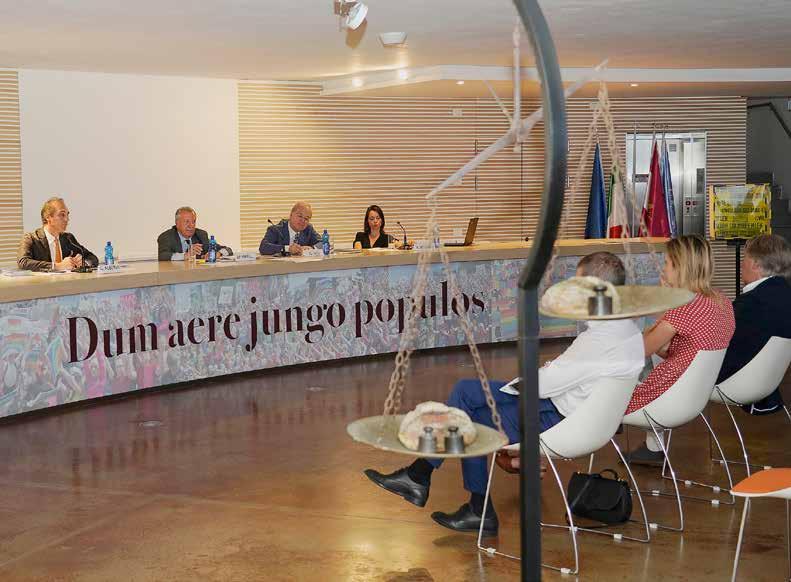
To conclude, as I mentioned, for mal equality between states does
not always go hand in hand with substantive equality.
For this reason, the UN needs support both internally and ex ternally, as an international insti tution of reference for discussing and striving to solve the problems of the world.
Respect for the rules and insti tutions of international law is one of the defences in place against anarchy and survival of the fit test.
This is why Italy supports the United Nations as a pillar of its foreign policy and continues to propose constructive, ambitious yet realistic solutions to contri bute to international peace and stability.
The voice of Maria DolensFor a sustainable economy
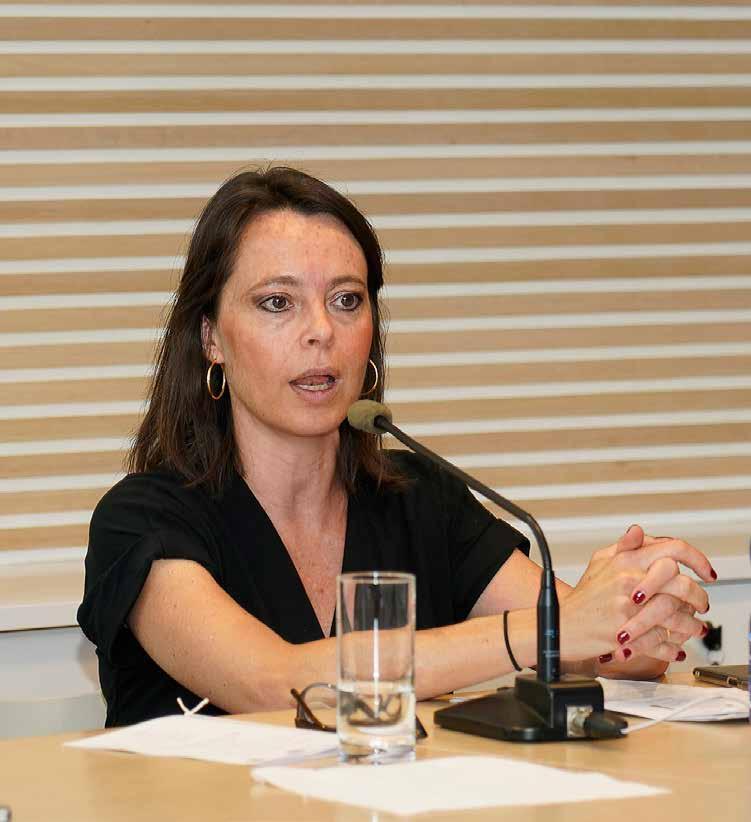
The fight against inequality is an inte gral part of the process of achieving sustainable development. This no tion was conceived within the United Nations starting with the Brundtland Report of 1987. From development that responds to the needs of the present without com promising the needs of future generations, the concept of sustainable development has progressively evolved to its current expres sion. The most recent plan was developed by the United Nations General Assembly, which in 2015 approved the 2030 Agenda and the 17 Sustainable Development Goals. These goals set sustainable development on four pillars – the economy, environment, society and legality - and identify the priorities in the world today.
Fighting gender inequality, forced labour and climate change are three of the challen ges that are crucial today for the achieve ment of Goal 10.
But these are unfortunately very ambitious goals. In relation to gender inequality, it is exemplary that of the 168 States which have ratified the United Nations Convention on the Elimination of All Forms of Discrimi nation against Women, many - even if this is contrary to the object and purpose of the convention - have done so but only by in cluding a saving clause and have in addition specified, that they wish to comply with tre aty obligations only insofar as they are com patible with their national law which is often highly discriminatory.
To this we further add the alarming statisti cs on gender equality and violence. With re gard to the second challenge, one can’t help but notice that the prohibition of forced la bour, one of the mandatory principles of in ternational law, is obviously also one of the most violated rules: the International Labor Organization estimates that more than 21 million individuals are in fact still forced into modern forms of slavery and trafficking.
Sustainable Development Goal 10, in parti cular, is aimed at the fight against inequality, to be interpreted with dual implications re garding inequality, both within and between states. It is useful to remember that in 2017, approximately 689 million individuals were still living in extreme poverty, with an inco me of less than $ 1.9 per day, a situation fur ther exacerbated by the subsequent pande mic and the recent geo-political crisis. The figures regarding internal inequalities are worrying as they are constantly increasing.
According to the 2030 Agenda, inequali ty must be fought by actuating internatio nal cooperation processes and, at the same time, implementing national policies that guarantee the promotion of social, econo mic and political inclusion of all, regardless of age, sex, disability, race, ethnicity, religion or other factors, and the guarantee of equal opportunities, also through the abrogation of laws and the elimination of discriminatory practices.
And finally, inequalities are aggravated by climate change, which has a more dramatic impact in the poorest regions of the world. According to the United Nations “Special Rapporteur” on human rights and extreme poverty, the richest countries, responsi ble for the vast majority of greenhouse gas emissions, have the ability to adapt to cope with global warming, while the poorest, who contributed much less - the poorest half of the world population produced only 10% of global emissions – sustain approximately 80% of the costs. The World Bank estima tes that without immediate action, climate change will lead to an additional 120 million people being reduced to poverty by 2030.
Goal 10, without adequate policies, could remain permanently unattainable.
The voice of Maria DolensMore than 21 million individuals are subjected to modern forms of slavery and trafficking
The ban on forced labour is one of the most violated rules
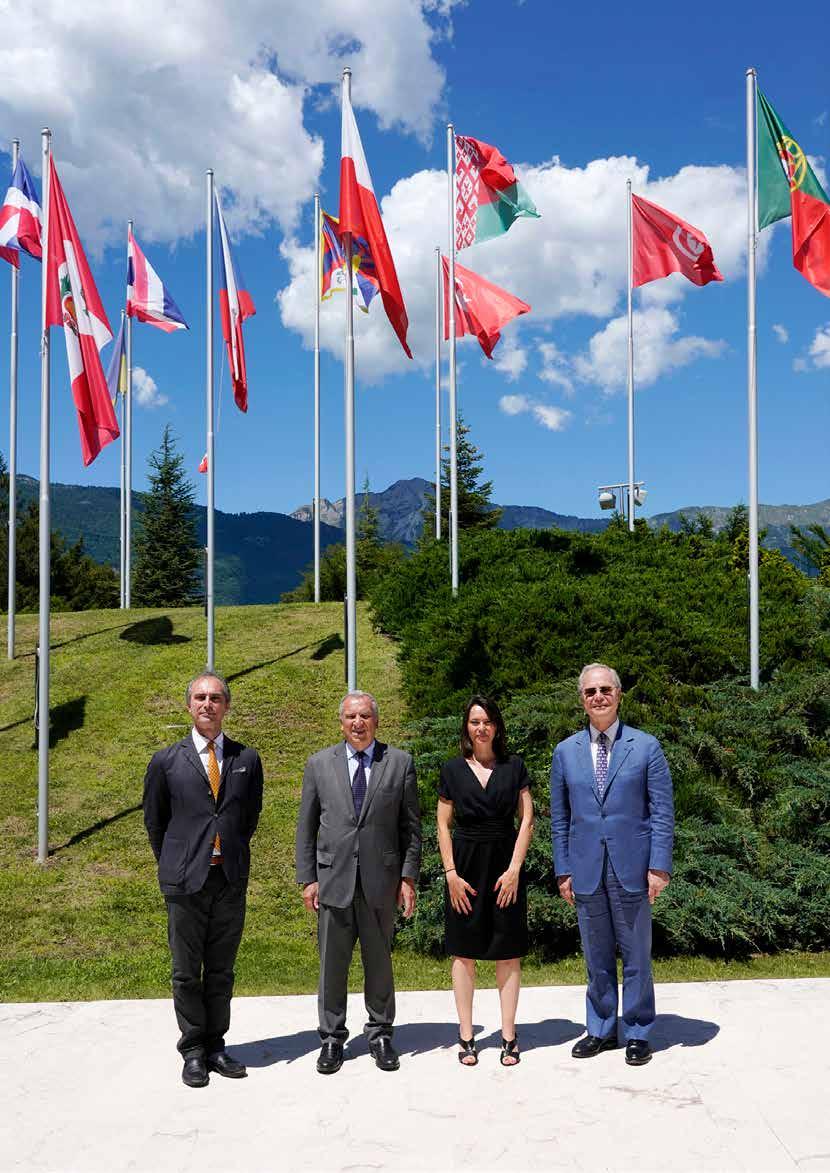 Along the Avenue of the Flags: from left Gianluca Alberini, Reggente Marco Marsilli, Angelica Bonfanti and Giuseppe Nesi
Along the Avenue of the Flags: from left Gianluca Alberini, Reggente Marco Marsilli, Angelica Bonfanti and Giuseppe Nesi
